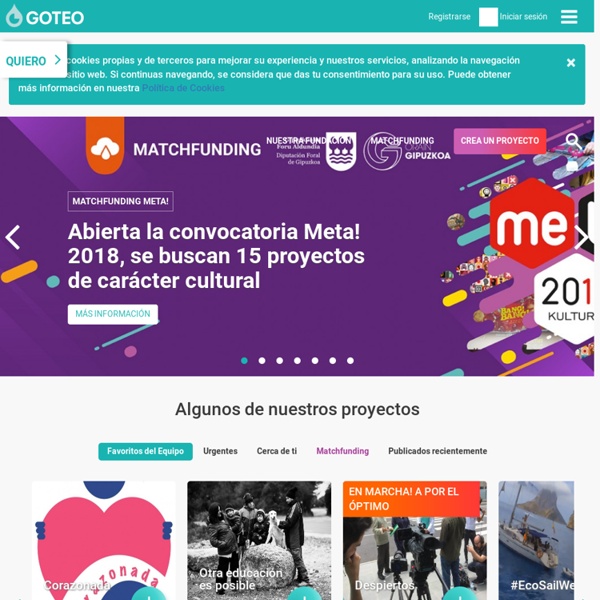



Consensus decision-making Members of the Shimer College Assembly reaching a consensus through deliberation. Consensus decision-making is a group decision-making process that seeks the consent of all participants. Consensus may be defined professionally as an acceptable resolution, one that can be supported, even if not the "favourite" of each individual.
Crowd funding Crowdfunding is the practice of funding a project or venture by raising monetary contributions from a large number of people, typically via the internet.[1] One early-stage equity expert described it as “the practice of raising funds from two or more people over the internet towards a common Service, Project, Product, Investment, Cause, and Experience, or SPPICE.”[2] The crowdfunding model is fueled by three types of actors: the project initiator who proposes the idea and/or project to be funded; individuals or groups who support the idea; and a moderating organization (the "platform") that brings the parties together to launch the idea.[3] In 2013, the crowdfunding industry grew to be over $5.1 billion worldwide.[4] History[edit] Types[edit]
Crowdsourcing Crowdsourcing is a sourcing model in which individuals or organizations obtain goods and services. These services include ideas and finances, from a large, relatively open and often rapidly-evolving group of internet users; it divides work between participants to achieve a cumulative result. The word crowdsourcing itself is a portmanteau of crowd and outsourcing, and was coined in 2005.[1][2][3][4] As a mode of sourcing, crowdsourcing existed prior to the digital age (i.e. "offline").[5] There are major differences between crowdsourcing and outsourcing. Crowdsourcing comes from a less-specific, more public group, whereas outsourcing is commissioned from a specific, named group, and includes a mix of bottom-up and top-down processes.[6][7][8] Advantages of using crowdsourcing may include improved costs, speed, quality, flexibility, scalability, or diversity.[9][10]
10 Passos do Crowdfunding - Blog Soul Social : Blog Soul Social Material utilizado em nossa Palestra sobre Crowdfunding para orientar pessoas interessadas em captar recursos pela Plataforma Soul Social – Ideias e Projetos. O conteúdo será utilizado em nossa Cartilha sobre Crowdfunding que sairá em breve! Siga os passos e boa sorte! 1 – Sua ideia
How it Works Here is how the Crowd Wise method can be implemented in practice through four easy steps: Starting with an open question, which could be anything from ‘what should we spend our money on next year’ to ‘ what’s the best way to tackle urban poverty? . A range of options is developed, as opposed to just two alternatives: A range of options is considered as opposed to just two alternatives:
The commons This article is about the term "commons" in political economics. It is not to be confused with common land. The commons is the cultural and natural resources accessible to all members of a society, including natural materials such as air, water, and a habitable earth. These resources are held in common, not owned privately. Definition and modern use[edit] The definition from the Digital Library of the Commons is; "the commons is a general term for shared resources in which each stakeholder has an equal interest".[1] The Factory of the Common lockitron/selfstarter Demoex Origem: Wikipédia, a enciclopédia livre. Democracia experimental (Demoex) 1 , um partido político sueco local, é uma experiência em democracia direta eletrônica, com votações pela internet, que teve início durante um seminário denominado "TI - Tecnologia da Informação e a Democracia" realizado em outubro de 2000 numa escola de Vallentuna, um subúrbio de Estocolmo 2 . Uma das razões de sua criação, além do desencanto generalizado com os políticos tradicionais, foi o fato de que na democracia representativa a opinião do Povo só é consultada uma vez a cada quatro anos. E após serem eleitos, os políticos tradicionais podem agir praticamente como bem entenderem até a próxima eleição 3 As discussões que se iniciaram naquele seminário, tanto online como na vida real, levaram um grupo de estudantes e professores a fundar um partido político Demoex, sem ideologia (no significado direita-esquerda), sem plataforma, e sem sede física, e que só tinha uma promessa: a democracia direta.
Alavancadora de Negócios Sociais Democracia líquida Origem: Wikipédia, a enciclopédia livre. Democracia líquida ou democracia delegativa é um projeto de democracia direta, no qual as votações se realizam por um mandato específico para uma determinada questão, e é suplementado por uma recomendação de ação (uma análise da questão em debate feita por especialistas na matéria, pró e contra). É um sistema misto entre democracia direta e democracia representativa, no qual os representantes do Povo são designados para votar em cada tema, ao invés de serem eleitos para um mandato amplo, com duração específica. Em alguns casos, na democracia líquida, o mandato específico pode ser delegado. No presente o partido pirata alemão, o partido local suéco Demoex, e a Listapartecipata italiana, cujo lema é O controle do governo nas mãos do Povo (e não somente no dia das eleições), dentre outros, já praticam e defendem a democracia líquida, em caráter experimental. Ver também[editar | editar código-fonte]
L12527 A PRESIDENTA DA REPÚBLICA Faço saber que o Congresso Nacional decreta e eu sanciono a seguinte Lei: Art. 1o Esta Lei dispõe sobre os procedimentos a serem observados pela União, Estados, Distrito Federal e Municípios, com o fim de garantir o acesso a informações previsto no inciso XXXIII do art. 5o, no inciso II do § 3º do art. 37 e no § 2º do art. 216 da Constituição Federal. Parágrafo único.
SISTEMAS COLABORATIVOS Sistemas Colaborativos é o livro-texto da disciplina homônima do currículo de referência da Sociedade Brasileira de Computação. Sistemas Colaborativos é a tradução adotada no Brasil para designar os termos: groupware e “CSCW” (Computer Supported Cooperative Work). Neste livro, escrito por pesquisadores atuantes nessa área no país, os conteúdos sobre sistemas colaborativos estão organizados de forma disciplinar.
SIBITE